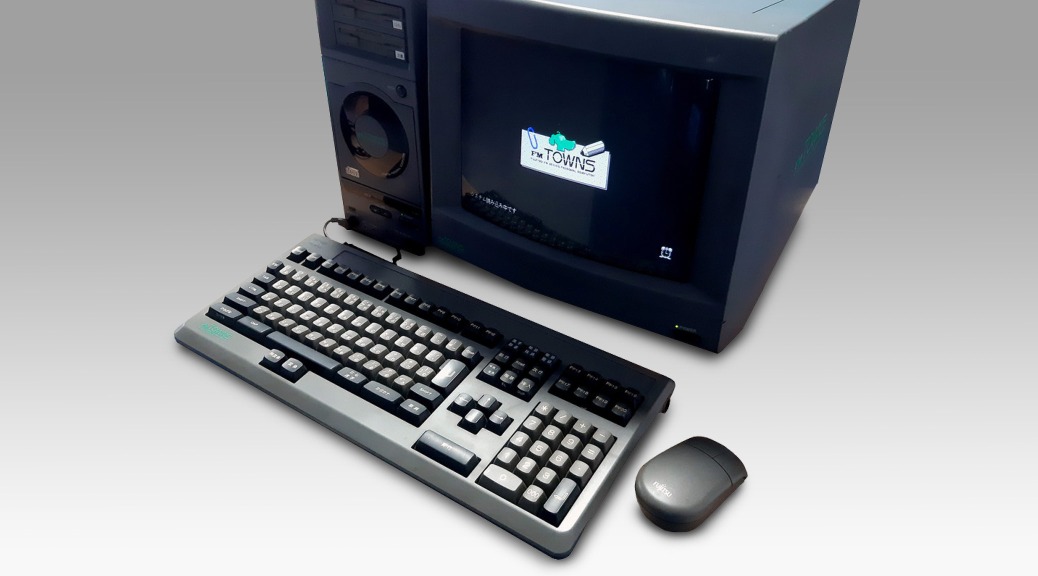The FM Towns is a Japanese personal computer, designed and manufactured by Fujitsu from 1989 to 1997. The “FM” part of the name means “Fujitsu Micro“, while the “Towns” part is derived from the code name that the system was assigned during development, “Townes”. This refers to Charles Townes, one of the winners of the 1964 Nobel Prize in Physics, following a custom at Fujitsu of naming PC products after Nobel Prize winners.
A variety of FM Towns models were designed, manufactured and sold, but at the heart of the machine’s success was the custom Fujitsu graphics chip, which allowed video modes ranging from 320×200 to 720×512 resolutions, with 16 to 32,768 simultaneous colours out of a possible 4096 to 16 million, depending on the video mode used. Most of these video modes have two memory pages, and it allows the use of up to 1024 sprites of 16×16 pixels each. It also has a built-in font ROM for the display of kanji characters. The system also has the ability to overlay different video modes. For example, the 320×200 video mode with 32,768 colours can be overlaid with a 640×480 mode using 16 colours, which allows games to combine high-colour graphics with high-resolution kanji text.
The FM Towns is able to play regular audio CDs, and also supports the use of 8 PCM voices and 6 FM channels, using the Ricoh RF5c68 and Yamaha YM2612 sound chips, respectively.
Games on the FM Towns regularly use red book audio CD music tracks. This was a novelty and an innovation far ahead of other PCs of the time, made possible by the standard CD-ROM drive found in every FM Towns computer.
The FM Towns features a graphical Operating System based on MS-DOS, called “Towns OS“, and can boot games directly from CD-ROM, due to it having a hidden, minimal MS-DOS system built into a system ROM. Most FM Towns systems also have two floppy disk drives, and the ability to expand the storage by adding a hard disk drive. In fact, a select few FM Towns games require installation to a hard disk to run, although this isn’t common. Most hard drives for the FM Towns were external – connected via a SCSI interface – and internal hard drives were rare.
Of the various models of FM Towns systems that were released, the first systems (FM TOWNS model1 and model2) were the most distinct and are based on an Intel 80386DX processor running at a clock speed of 16MHz, with the option of adding an 80387 FPU. They feature one or two megabytes of RAM (with a maximum possible of 6MB), one or two 3.5″ floppy disk drives, a PCMCIA memory card slot, and a single-speed CD-ROM drive. Also included in the package were a custom gamepad, a mouse and a microphone.
The earlier, more distinctive FM Towns models featured a vertical CD-ROM tray on the front of the case and were often referred to as the “Gray” Towns. These were the ones most directly associated with the “FM Towns” brand.
In 1993 the FM Towns Marty was released, which was a game console compatible with existing FM Towns games.
Although the FM Towns range never made any significant impact outside of Japan, it was definitely a system that was ahead of its time and features a variety of impressive games. In our FM Towns Special this week we’re going to be highlighting some of the best (and not-so-best) games on the system.
Here are all the FM Towns games featured on thekingofgrabs.com – in chronological, then alphabetical, order:
Dungeon Master (1989)
The NewZealand Story (1989)
Turbo Out Run (1989)
Bubble Bobble (1990)
Chaos Strikes Back (1990)
Operation Wolf (1990)
Zak McKracken and the Alien Mindbenders (1990)
Chase HQ (1991)
Marble Madness (1991)
Raiden Densetsu (1991)
Shadow of the Beast (1991)
Indiana Jones and the Fate of Atlantis (1993)
Ultima Underworld: The Stygian Abyss (1993)
Viewpoint (1993)
Note: our FM Towns Special was prompted by our recent discovery of the emulator, Tsugaru, which is being developed by “Captain YS“. Previously, FM Towns emulation has been somewhat patchy due to the machine’s Japanese origins, and the discontinuation of the development of various related emulators, but Tsugaru has – in my opinion – revitalised FM Towns emulation and made the process of playing FM Towns games easier and more enjoyable. Tsugaru works like a Virtual Machine and allows the user to customise and save different profiles, so you can easily experiment with different configurations and save them for specific games. It also allows for easy hard drive setup; has built-in tools for blank floppy disk creation, and supports save states – all of which are very handy. Overall, Tsugaru is an excellent emulator that promises to unlock a reliable path towards the many decent FM Towns games that are available. It’s also very good for taking screenshots of games, which of course I like! So check Tsugaru out if you want to see what the FM Towns is capable of.
More: FM Towns on Wikipedia
More: Tsugaru on Github.com



